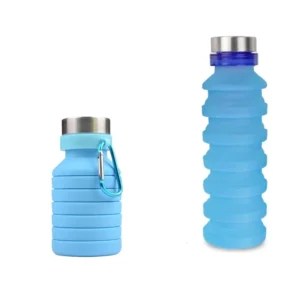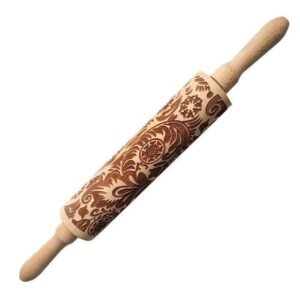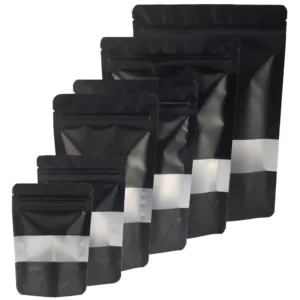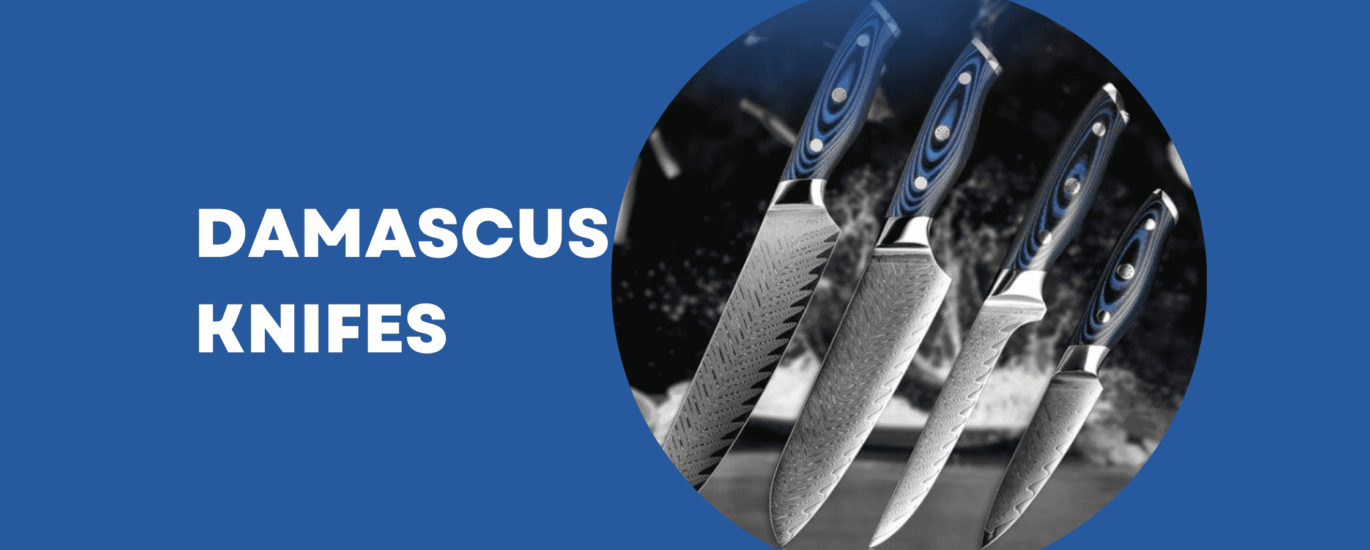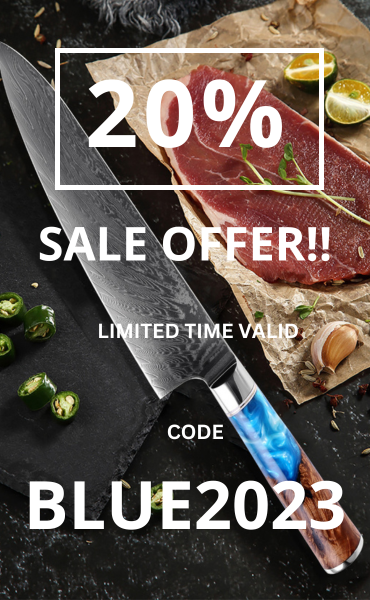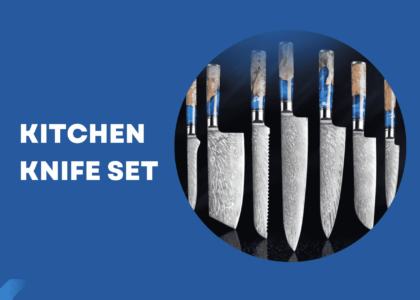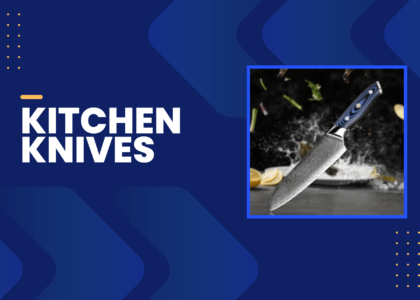Introduction
Welcome to the world of Damascus knifes, where artistry and function intertwine. Discover the rich history and exceptional craftsmanship behind these remarkable blades.
Background of Damascus Steel
Damascus steel, known for its distinctive patterns reminiscent of flowing water, has long been a symbol of quality and craftsmanship in metallurgy and blade-making. Originating from India and the Middle East, this steel is celebrated for its razor-sharp capabilities and resistance to shattering. The steel, crafted by folding various metal layers and forging them together, creates robust and durable blades. These ancient metalworking techniques yield blades that are not only functional but also aesthetically captivating, making them highly prized among collectors and chefs.
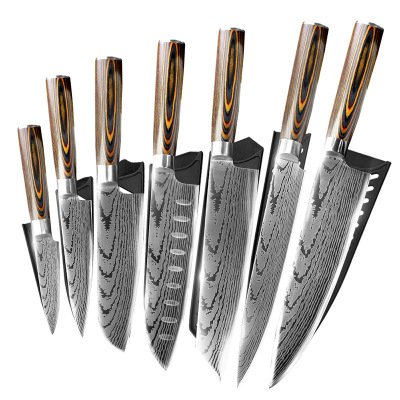
Significance in the Culinary World
In the culinary realm, Damascus knifes signify premium quality and exceptional performance. Chefs and culinary aficionados often pursue these knives for their remarkable sharpness, durability, and precision in cutting. The intricate patterns on the blades are not merely decorative but signify meticulous craftsmanship and centuries-old techniques.
Unique Features of Damascus Knifes
Damascus knifes are distinguished by unique features that extend beyond their visually appealing patterns. The blades boast remarkable hardness and edge retention, ensuring they remain sharp even after extensive use. Furthermore, the layering process in their creation provides a level of toughness that prevents them from being brittle and susceptible to chipping. The patterns on each knife are unique, providing a level of individuality and character to each piece.
Exploring the Intricacies of Damascus Knives
Damascus knives, or “Damascus knifes,” carry a rich, multifaceted history and have been a symbol of craftsmanship and quality in the blade-making industry. Below, we delve into seven fascinating facts about these exquisite knives, exploring their origins, manufacturing techniques, and unique characteristics.
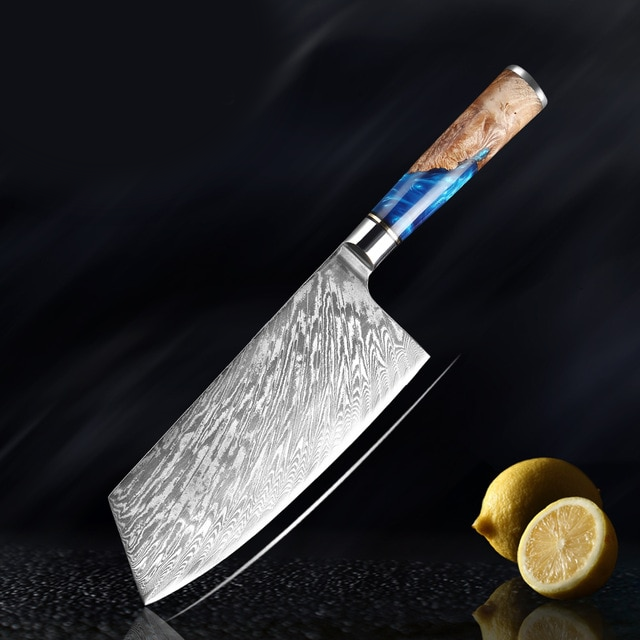
1. Origin and Distribution
- Traditionally Made In: Syria
- Also Found In: Other parts of the Middle East, North Africa, and Europe
Damascus knives were initially crafted in Syria but have found their way into various regions across the globe, each carrying the legacy and skilled craftsmanship from their place of origin.
2. Unique Manufacturing Technique: “Fluxing”
- Technique Name: Fluxing
- Process: Folding and welding two different steel types together
The “fluxing” technique involves a meticulous process of folding and welding different steel types, creating a robust and durable blade characteristic of Damascus knives.
3. Versatility in Material Use
- Potential Materials Include:
- Carbon steel
- Stainless steel
- Titanium
Damascus knives showcase a versatile range in their construction materials, each contributing to the blade’s durability, appearance, and performance.
4. The Creation of the Distinctive Pattern
- Process: Heating and quick quenching
- Quenching Mediums: Water or oil
The distinctive pattern on the blades of Damascus knives is achieved by heating the metal until it’s extremely hot and then rapidly quenching it in a medium, such as water or oil.
5. Repair and Re-tempering
- Repair Method: Re-tempering
- Alternative Materials: Different types of steel and/or heat treatment
Even if a Damascus knife becomes damaged or loses its sharpness, it can be restored through re-tempering, utilizing different steel types or heat treatment methods to bring it back to optimal condition.
6. The Art of Layering
- Composition: Several metal layers
- Result: Stunning patterns and textures
A genuine Damascus knife is crafted from several different metal layers, folded together, creating mesmerizing patterns and textures that are not only visually appealing but also contribute to the blade’s strength and durability.
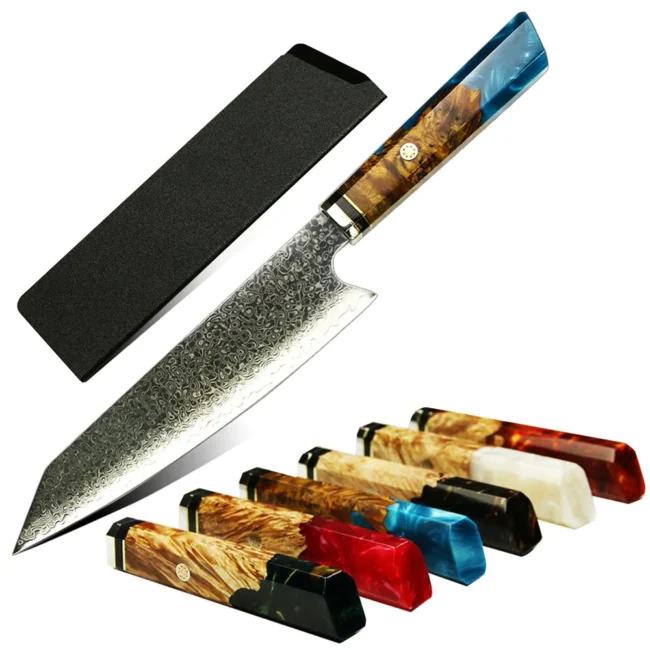
7. Table of Notable Characteristics
| Feature | Description |
|---|---|
| Sharpness | Renowned for their exceptional cutting ability |
| Patterns | Known for the unique, wavy or mottled patterns on the blades |
| Durability | Crafted to resist shattering and maintain sharpness |
| Repairability | Can be repaired and re-tempered if damaged or dulled |
| Material Versatility | Made from a variety of materials, including carbon steel, stainless steel, and titanium |
| Historical Significance | Holds a colorful history, being traditionally made in Syria and utilized in various regions |
Damascus knives continue to be a symbol of intricate craftsmanship and quality, intertwining historical techniques with modern applications, resulting in blades that are as functional as they are beautiful.
The Making of Damascus Knives
Crafting Process
The crafting process of Damascus knives is a meticulous and labor-intensive endeavor that has been refined over centuries. It begins with selecting different types of steel, which are then melted, folded, and hammered together numerous times. This folding and reforging process, known as pattern welding, creates the distinctive wavy or mottled patterns that Damascus knives are celebrated for. The blade is then shaped, sharpened, and polished, ensuring that each knife is not only a functional tool but also a work of art, reflecting the skill and expertise of the artisan.
Material and Design
When it comes to material and design, Damascus knives are unparalleled in their aesthetic and functional synergy. The materials typically involve layers of high-carbon steel and nickel, which are forge-welded together. The design intricacies lie in how these layers are manipulated during the forging process. Different techniques, such as twisting, coiling, and folding the steel, result in a variety of stunning patterns, including the popular “raindrop” and “ladder” designs.
Quality and Durability
Damascus knives are synonymous with quality and durability. The repeated process of folding and hammering during forging not only creates signature patterns but also eliminates impurities, ensuring a uniformly hard and durable blade. The layered structure provides a tough, resilient knife that can withstand rigorous use without becoming brittle or losing its edge. The quality is evident in the blade’s sharpness, edge retention, and overall longevity, making it a favored choice among professional chefs and culinary enthusiasts.
Conclusion and Final Thoughts
Recap of Key Points
In summary, Damascus knifes captivate with their unique, layered patterns, a testament to the intricate crafting process and skilled craftsmanship. Their quality, durability, and aesthetic appeal, derived from the meticulous selection of materials and design intricacies, have established them as a pinnacle in the culinary world.
Final Verdict
Damascus knifes are undoubtedly a blend of art and functionality, offering unparalleled quality and durability. Investing in a Damascus knife means acquiring a piece of history, craftsmanship, and a tool that meets the highest culinary standards. For enthusiasts and chefs alike, these knives are a worthy addition to any collection.
FAQs
1. What makes Damascus knives special?
Damascus knives are celebrated for their distinctive, wave-like patterns and exceptional sharpness. The intricate layering of steel, forged and folded multiple times, creates a blade that combines aesthetic beauty with peak functionality, making each knife a unique piece of artful craftsmanship in the culinary world.
2. How to care for Damascus knives?
Caring for Damascus knives involves regular sharpening, hand-washing, and immediate drying to maintain their edge and prevent corrosion. Storing them in a knife block or magnetic strip, away from other utensils, ensures the delicate blade is protected, preserving its functionality and aesthetic appeal for years to come.
3. Are Damascus knives worth the investment?
Yes, Damascus knives are often considered a worthwhile investment due to their exceptional sharpness, durability, and unique aesthetic. The meticulous crafting process and high-quality materials ensure a blade that performs excellently in culinary tasks while also being a visually stunning piece in any kitchen or collection.
4. Can Damascus knives rust or corrode?
While Damascus knives are admired for their durability and quality, they can rust or corrode if not maintained properly. Ensuring the knife is dry before storage and using mineral oil can prevent oxidation. Regular maintenance and proper storage are key to preserving its pristine condition and longevity.
5. Are Damascus knives good?
Absolutely, Damascus knives are renowned for their excellent quality, sharpness, and durability. The layered steel not only provides a razor-sharp edge but also ensures the blade retains its sharpness over time. Their aesthetic appeal and performance make them a favored choice among professional chefs and culinary enthusiasts alike.
6. Why Damascus knife is so expensive?
The high cost of Damascus knives is attributed to the labor-intensive crafting process, skilled artisans, and high-quality materials used. Each knife is a result of numerous hours of forging, folding, and refining, ensuring a product that delivers unparalleled quality, durability, and a unique, beautiful pattern on the blade.
Frequently Linked Pages
1. Damascus Kitchen Knives – Crafting Excellence: Unveiling the World of Damascus Kitchen Knives
2. Damascus Kitchen Knife – Unlocking the Elegance of Culinary Art: An In-depth Exploration of Damascus Kitchen Knife
3. Damascus Chef Knife – Exploring the Elegance of the Damascus Chef Knife: A Culinary Marvel in Modern Kitchens
4. Knife Damascus – Unveiling the Craftsmanship of Knife Damascus: A Comprehensive Guide
5. Kitchen Knives – Mastering the Cut: A Comprehensive Guide to Kitchen Knives
6. Knives Damascus – Mastering the Art of Culinary with Knives Damascus: A Comprehensive Guide


